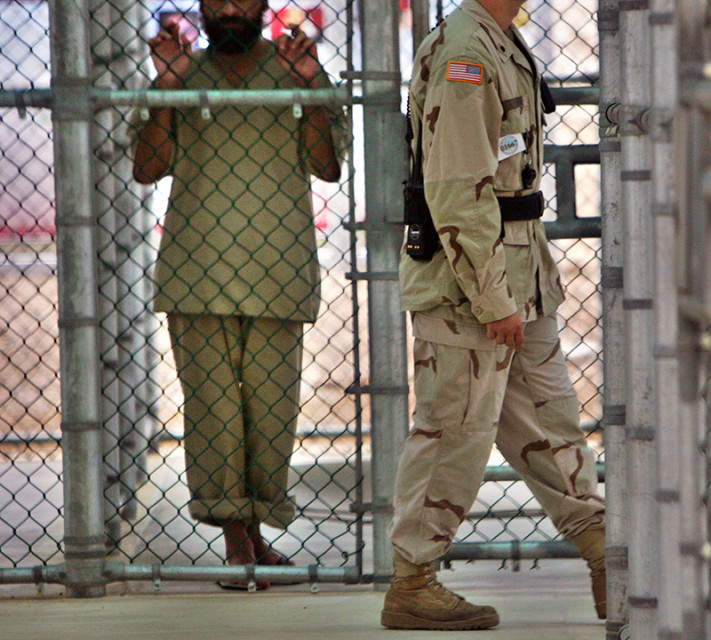
In this photo reviewed by U.S. military officials, a detainee whose name, nationality and facial identification are not permitted holds onto a fence as a U.S. military guard walks past the grounds of the maximum-security prison at Camp 5 in the Guantanamo Bay U.S. Naval Base on June 26, 2006. Photo courtesy of REUTERS
WASHINGTON (RNS) After years of activism and campaigns, religious groups have mixed reactions to the White House’s proposed closure of the Guantanamo Bay military prison.
The blueprint for closure, submitted to Congress on Tuesday (Feb. 23) for review, would establish a U.S. location for detainees currently held at the detention facility located at the U.S. naval base in Cuba.
Groups in favor of the prison’s closure say the measure is not enough, since remaining detainees may continue to be held indefinitely without either charge or trial.
RELATED STORY: Military judge to rule on whether to ban female guards from touching Muslim detainees
“We welcome the closure, but we’re still very concerned about the prospect of indefinite detention,” Robert McCaw of the Council on American-Islamic Relations told RNS. “We’re just importing Guantanamo and its legal framework to American shores. While the prison would be gone, the prisoners would still be a symbol of America’s lack of due process.”
Under the proposal, which would fulfill President Barack Obama’s campaign promise made seven years ago, the defense department would transfer 35 detainees to foreign countries and review remaining detainees to see if their detention is necessary.
“The president’s goal of transferring or trying almost all of the detainees can only improve our moral standing in the world,” the Rev. Ron Stief of the National Religious Campaign Against Torture said in a statement. “However, an important flaw in the President’s plan is that it is immoral and contrary to American values for the U.S. to hold anyone without the reasonable prospect of a trial.”
The NRCAT has rallied more than 300 faith-based organizations to campaign against the detention facility. In January, the group protested the prison’s 14th anniversary in front of the White House; in 2013, members held a 24-hour fast alongside various clergy members and collected signatures from more than 40 religious leaders to push Obama for closure.
TRENDING STORY: Trump, Cruz popularity represents two very different Christian failures
The American Center for Law and Justice, a Christian-based social activist group founded by televangelist Pat Robertson, said the move will harm the nation’s security.
“The announcement by President Obama underscores the blatant political nature of this president during his two terms in office,” said ACLJ chief counsel Jay Sekulow. “Closing GITMO not only places America in grave danger, it bootstraps the next president — continuing a foreign policy that is dangerous to America.”
Rabbi Shmuly Yanklowitz, who leads the Orthodox social justice organization Uri L’Tzedek in Arizona, commended Obama’s proposal.
“Rather than being a symbol of strength, Guantanamo has made us all less safe,” Yanklowitz told RNS in an email. “Judaism rejects the cruel tactics of torture, even for those suspected of the worst crimes … the religious community must not be silent when it comes to promoting human rights for all.”
He said moving the prisoners to the mainland would be a step closer to due process for them, citing the passage in Psalms 102:21 that it should be possible “to hear the groaning of the prisoner.”
(Aysha Khan reports for RNS)




